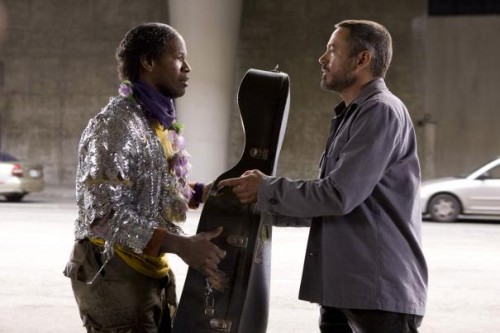
Someone should have told Steve Lopez that his story just wasn’t that interesting. Granted, discovering a musical prodigy on the streets of L.A. is quite zesty, but that can only be the beginning of the tale. And since this whole thing only happened recently (within the last few years), there’s no real ending to the true story The Soloist is based on.
Cue the incredible mess that is the film adaptation. Directed by Joe Wright, the artistic mind behind Atonement, and written by Susannah Grant, who gave us two worthy scripts in Erin Brokovich and In Her Shoes, one wonders how these talents failed to zero in on the juice in this story of a L.A. Times columnist who meets homeless genius – it’s Rain Man meets Ray for goodness sake.
Not to mention an impressive acting duo, Robert Downey Jr. playing Lopez and Jaime Foxx playing Nathaniel Anthony Ayers Jr. (as he calls himself over and over and over), the aforementioned musician.
The acting from these two is solid, especially on the part of Foxx, who at first seems to be doing his version of Dustin Hoffman’s Raymond but quickly finds his grove and creates his own character, getting lost in it. Downey Jr. doesn’t get as far, but does a good job being sarcastic and witty and disarmingly tender when the script calls for it. Unfortunately, Grant’s script calls for it at strange, and rather poorly paced, moments – until she has Downey Jr. pour it all on all syrupy at the end.
But is the pacing Grant’s fault or Wright’s? Let’s blame it on both – it appears Grant didn’t write a tight enough adaptation of the main source material (man meets homeless man helps homeless man who helps him in return) and Wright didn’t fix the problem but rather worsened it with too much visual flare, something which hindered Atonement, but only very slightly.
There is no slightly here. This film preaches and it preaches long and windy like. About the homeless population in Los Angeles and their plight, about right-wing politics (Foxx’s character says, and I quote: “I used to sleep on Wall St., but it’s too dirty”), about the death of journalism, about the writer’s process, about medicating (and over-medicating) the sick – just to name a few.
Add to that around 20 minutes of useless flashbacks to when Foxx’s Ayers was younger, struggling with his budding schizophrenia while attending Julliard. But this film’s not a biopic, is it? So why is there biopic-like flashbacks? And, furthermore, why are these flashbacks not given any effectual indication, occurring during the film without any break, more disjointing and confusing than it is fluid, assuming that’s Wright’s intention.
It seems that even Wright doesn’t know what his own intentions were and that this film got lost somewhere in it’s production so as never to be found again in any coherent way. Consider a scene in which Lopez delivers a cello to Ayers and proceeds to listen to him play. The framing is beautiful and the close-ups work and the music a sort of perfect kind of grandiose. Then, right then, the camera tracks up and finds a flock of birds which it then follows across L.A. and under bridges and over valleys far far away from the film’s narrative. In this moment you have a metaphor for the entire film.
Early on, Lopez takes Ayers to LAMP, a state housing facility, and the viewer is introduced to the hell that is urban homelessness. One wonders if the real-life Lopez spent as much time on this subject in his book as Wright does in the film. And although LAMP and it’s surrounding homeless community are both observed thoroughly, the film never takes the time to develop the characters opting instead for multiple scenes of crack smoking and ghastly durg overdoes. These images are powerful, but in a cheaper shock-and-awe way, happening to characters not worth caring about.
Some scenes in this thing are beautiful, such as one color tone sequence in which Wright attempts to go inside the mind of a schizophrenic (hearing colors and seeing sounds) or when Lopez struggles with writer’s block towards the film’s beginning.
There’s at once too much and not enough. One of the two could have been bearable, but the combination makes The Soloist a manic failure of rather epic proportions.
4 out of 10
What did you think of this? Did you like it? Foxx’s performance?

